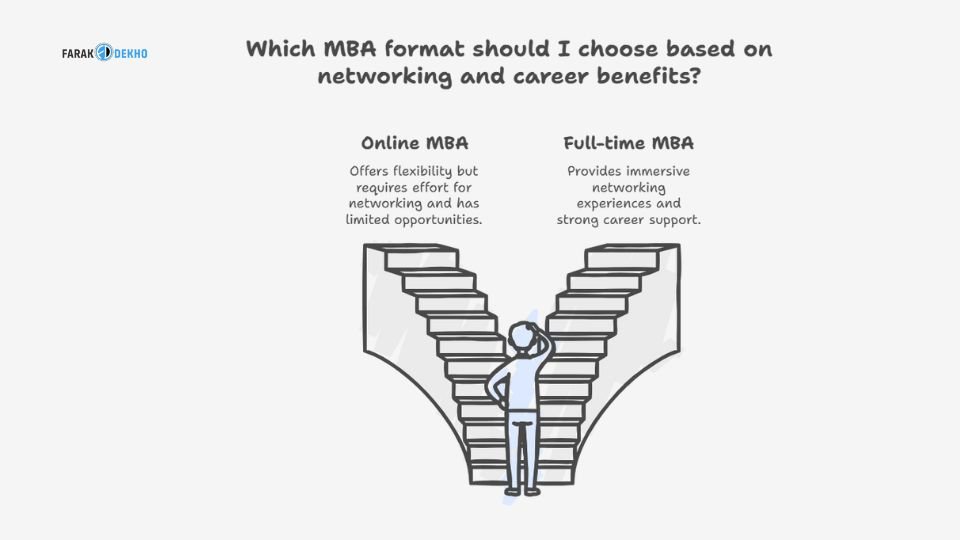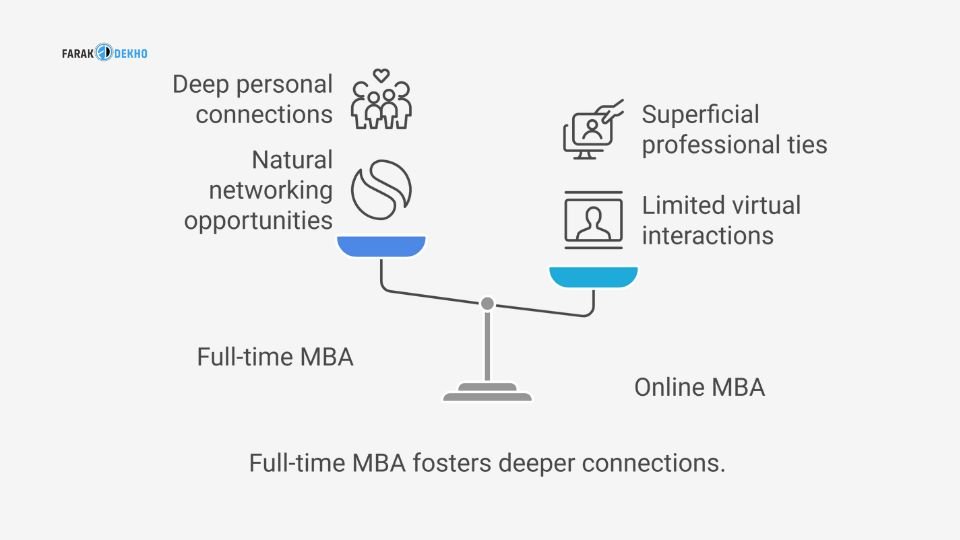Choosing between an Online MBA and a Regular MBA is a big decision. If you are considering an MBA, you probably want better career opportunities, a higher salary, or new skills. But which format will help you achieve your goals?
To understand this better, a survey was conducted with 20 candidates who had either completed or were currently enrolled in the Eicher MBA program. They were asked about their primary reason for pursuing an MBA. The results were eye-opening:
- 65% said they wanted a better job or higher salary.
- 20% aimed to learn new skills.
- 15% wanted to keep their career options open (such as finance, marketing, or operations).
- Surprisingly, none of them chose MBA for networking opportunities or alumni status.
This survey highlights what most MBA aspirants truly expect from their degree. Whether you choose an Online MBA or a Regular MBA, your choice should align with your career goals.
In this article, we will break down the differences between Online and Offline MBAs in the simplest way possible—so that you can make an informed decision. Let’s get started!
Understanding Online MBA: Networking and Career Benefits

When you choose an online MBA, one of the biggest differences is networking. In a full-time MBA, you interact with classmates daily, build strong relationships, and form a professional network that lasts for years. But in an online MBA, engagement with batchmates is limited—often no stronger than a WhatsApp message.
Networking in an online MBA mostly happens during placements. Once you complete the program, there is some interaction—sharing referrals, discussing job opportunities, and helping each other find better roles. However, this usually lasts for only three to six months after graduation.
Beyond this period, if you want to stay connected and build long-term relationships, you have to put in extra effort. Unlike a full-time MBA, where networking happens naturally in classes, group projects, and campus life, an online MBA requires you to actively invest time in maintaining connections.
While an online MBA offers flexibility and allows you to study while working, it’s important to understand that the networking opportunities are not as strong as in a full-time MBA. If you’re someone who values peer interactions, alumni connections, and career support, this is a factor you should consider before making your decision.
The Regular MBA Experience: Stronger Bonds and Better Networking

A full-time MBA provides a completely different experience compared to an Online MBA—especially in terms of networking and peer engagement.
For example, a graduate from IIM Lucknow shared how the two-year program helped him build lifelong professional and personal connections. He recalled how classmates would spend time together outside of lectures—grabbing meals, working on projects, and supporting each other through challenges. Over time, these interactions naturally developed into strong friendships and a solid professional network.
In contrast, students from top Online MBA Colleges like ISB, NMIMS, or Amity Online often rely on virtual discussions, webinars, and networking events to build connections. While the engagement is different, those who actively participate in discussion forums and alumni networks can still form valuable professional relationships.
Beyond academics, campus life played a crucial role in strengthening these connections. Students engaged in extracurricular activities, played sports, and collaborated on events, making their interactions even more meaningful. These experiences created a sense of community and support that lasted well beyond graduation.
Compared to an Online MBA, where networking requires conscious effort and is often limited to virtual interactions, a full-time MBA naturally fosters deep connections. This strong professional network often proves valuable in career growth, job opportunities, and long-term collaborations.
This is why many professionals consider a full-time MBA to be a better option for networking and career advancement than an online program.
Brand Value: Does It Really Matter in an MBA?
When discussing brand value in an MBA, we must consider only Tier 1 B-schools. In the IIM category, institutes like Bangalore, Lucknow, Ahmedabad, Calcutta, Kozhikode, and Indore (commonly referred to as BLACKI) are well-known for their strong brand reputation. Outside of IIMs, colleges like JBIMS, FMS, MDI Gurgaon, and SPJIMR also hold significant value.
But here’s the key point—brand value is subjective. It depends on how people perceive it rather than a strict definition.
To understand this better, imagine you’re riding a two-wheeler and suddenly a car collides with you. If it’s a regular car like a Swift, the reaction will be standard. But if it’s a luxury car, people might assume something different about the driver.
The same logic applies to MBA brand value. If someone has an IIM or IIT tag, society often assumes they are highly capable and intelligent. This social validation can influence how others perceive and interact with you, both professionally and personally.
However, it’s important to remember that brand value has its limits. While it can open doors and create first impressions, long-term success still depends on skills, performance, and real-world expertise.
So, while choosing an MBA program, don’t just chase a brand name—focus on what truly adds value to your career.
Still Confused About Online vs. Offline MBA? Let’s Talk!
Choosing the right MBA program is a big decision, and we’re here to help! Whether you have questions about placements, career growth, or the best online MBA options, our expert counselors are ready to guide you.
📩 Fill out the form below, and we’ll get in touch with you!
Online MBA vs. Offline MBA: A Practical Comparison
An MBA is not just about learning—for most students, the primary goal is a better salary and job opportunities. While both Online and Offline MBA programs offer value, they differ significantly in networking, skill-building, brand value, and career impact.
Key Differences: Online MBA vs. Offline MBA
A Quick Comparison
| Parameter | Online MBA | Offline MBA |
|---|---|---|
| 🤝 Networking | 🌐 Virtual interactions; Requires extra effort | 🎓 Strong campus connections; Events, group work |
| 🏅 Brand Value | ✅ Good if from top institutes; Mixed perception | 🚀 Tier 1 schools preferred; Stronger social validation |
| 📚 Skill Development | 🖥️ Limited live interaction; Self-paced learning | 💡 Hands-on projects; Live case studies, discussions |
| 💼 Internships | ⚠️ Limited practical exposure; Self-driven | 🔥 Industry internships; Real-world experience |
| 💰 Jobs & Salary | 📈 Self-driven job search; Fewer placements | 🚀 Campus placements; Strong networks, higher salaries |
Key Takeaways
- 🌐 Online MBA: Flexible, cost-friendly, but self-driven effort needed for networking and jobs.
- 🎓 Offline MBA: Structured learning, strong industry links, better ROI for top-tier schools.
Final Verdict
- Online MBA is a good option for working professionals who need flexibility, but networking, skill-building, and placement benefits are limited.
- Offline MBA (Classroom Program) provides better learning, stronger peer connections, and better job opportunities, making it a more impactful choice for career growth.
Top 5 Online MBA Colleges
The reality of placements in an online vs. offline MBA
Placements have become a key selling point for MBA programs. Colleges now highlight their placement reports, salary packages, and job assistance to attract students. But here’s the truth: job opportunities depend heavily on the mode of learning and the college’s credibility.
If you’re considering an Online MBA solely for placement assistance, you need to be cautious. Many colleges promise placements, but in reality, if market conditions are tough, a significant portion of the batch may remain unplaced or settle for lower salaries.
In contrast, a full-time MBA program offers a structured placement season with strong employer connections, giving students a better chance at securing high-paying roles. Even if salaries are lower initially, graduates from reputed institutions have better long-term career growth due to their strong alumni network and brand recognition.
That said, Online MBA graduates can still benefit, especially if they combine their degree with industry certifications. Some candidates successfully leverage online MBA credentials in job switches, but whether an employer values it depends on their hiring criteria and perception of online education.
Final Takeaway
- Offline MBA provides structured placements, better employer connections, and stronger salary growth.
- An online MBA can help career advancement, but placement opportunities are limited, and employer perception varies.
Final Thoughts: Is Online MBA Worth It?
If you can’t leave your job or have travel constraints, an Online MBA is still better than nothing. However, if your goal is career growth in specific fields like finance or IT, then professional certifications (such as CFA, CPA, PMP, AWS, etc.) often hold more value than an online or distance MBA.
What Should You Choose?
✅ If you want structured placements, strong networking, and career growth, go for a full-time MBA.
✅ If you need flexibility, an Online MBA can be an option, but choose one from a reputed institution.
✅ If you’re in finance or IT, professional certifications may provide better job opportunities than an online MBA.
At the end of the day, the right choice depends on your career goals and learning preferences.

Lovepreet Sachdeva is an SEO Specialist with extensive experience in helping businesses improve their online presence. He is dedicated to providing top-notch SEO services and personalized strategies to boost your website’s performance. Contact him today for professional SEO assistance.





